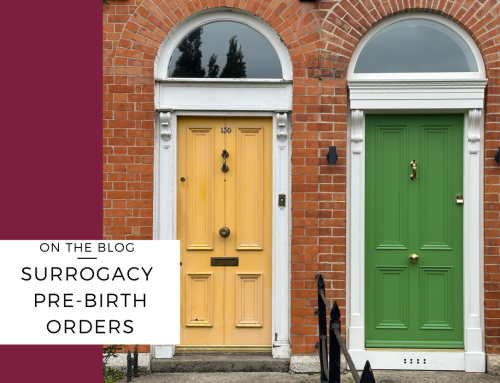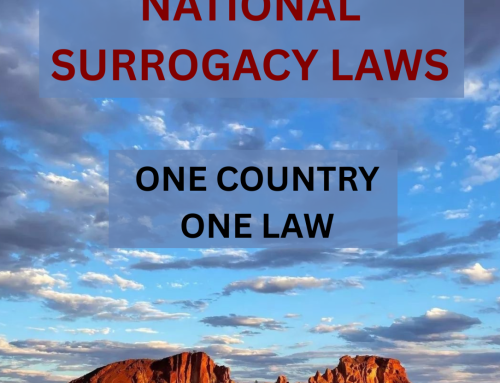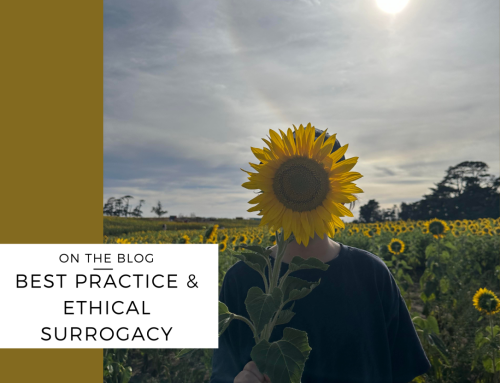Reforming surrogacy in NSW.
The New South Wales Surrogacy Act is being reviewed by the NSW government. You can read about the review about surrogacy in NSW. It is important that the government is informed by the lived experiences of surrogates, intended parents and people born via donor conception and surrogacy. Counsellors and lawyers will be making submissions, as well as fertility service providers. Some people who are against surrogacy will be making submissions – let’s make sure our voices are heard over the noise.
Some reforms have already been made, including to parentage orders for children born via international surrogacy.
The Australian government announced a review of Australia’s surrogacy laws which will happen in 2025-2026. You can be part of the Review and make a submission too!
If you’re nervous about what to write in a submission, make sure to read the Discussion Paper about Surrogacy in NSW on the government website. Submissions can be written in your own words – you don’t need to use complex legalese. Your own experience of surrogacy is important, so include your story as much as you want to share. You will need to request that your name is kept confidential, if that is what you prefer.
The Surrogacy Act provides the framework for surrogacy in NSW. You can read an explanation of the current legislation.
There are some simple changes that I think would improve surrogacy in NSW. There are larger, more complex reforms we could implement as well. You might have your own ideas for reform as well – I’d love to hear your thoughts. You can read my submission as well.
Some things I think should remain the same:
- There must be a medical or social reason for surrogacy – the intended parents must have a reason why they cannot or should not carry themselves.
- The parties should be over the age of 25 years.
- There are no requirements for treatment to occur within New South Wales and this should continue.
- Traditional surrogacy and gestational surrogacy should be treated in the same way.
- The parties should engage with a qualified counsellor prior to entering the arrangement.
- The parties should engage with independent lawyers prior to entering the arrangement.
- The parties should sign a surrogacy agreement prior to pregnancy attempts.
Some straight-forward changes I think should be made to the Surrogacy Act:
- Allow paid advertising: Section 10(2)(b) of the Act prohibits advertising for a surrogate or a willingness to be a surrogate, if the advertisement is paid. A simple repeal of this subclause would allow for paid advertising, such as taking an ad out in the local newspaper.
Finding a surrogate in Australia is very difficult – partly because of restrictions on advertising for a surrogate. One small change to the legislation could make this easier.
. - Decriminalise overseas commercial surrogacy in NSW: Section 8 of the Surrogacy Act prohibits a person from entering a commercial surrogacy arrangement, which is defined in Section 9 of the Act. These two clauses are similar to those in other state legislation. What is different in New South Wales is the ‘geographical nexus’ clause contained in Section 11, which criminalises NSW residents for engaging in commercial surrogacy overseas. This means that even if the commercial surrogacy arrangement occurs in a country where it is legal, the intended parents may be breaking a NSW law. A similar law exists in the Queensland.
There have been no prosecutions of surrogacy in NSW of residents for engaging in commercial surrogacy internationally. Section 11 has not served to deter intended parents from travelling overseas for commercial surrogacy. Children should be not punished for their parents engaging in commercial surrogacy (or their existence). Section 11 stigmatises surrogacy, which in turn stigmatises the children born via surrogacy.
We should repeal Section 11.
. - Surrogacy counselling is required in each state, in various forms. Surrogacy in NSW requires the parties to engage in pre-conception surrogacy counselling, as well as two types of post-birth counselling. One is contained in Section 35(2) of the Act – what is known as ‘relinquishment’ counselling. Another is contained in Section 17 and is known as ‘independent counselling.’ New South Wales requires more post-birth counselling than any other state. I believe the two types of post-birth counselling are unnecessary and could be managed by one counsellor, under Section 17.
If there is to be post-birth counselling, I think there should be requirement for one type only.
. - Surrogate’s consent: Section 31 requires that the parties must consent to the making of the parentage order. This is a general requirement across Australia, except in Western Australian gestational surrogacy arrangements. While there is a requirement for the birth parents to be given notice of the application for a parentage order, there is no requirement for them to agree to it.
Under Section 22 of the Act, the best interests of the child are paramount to the considerations for making a parentage order. Family lawyers will know that a parent’s consent is not necessary for the making of a parenting order – so why is it necessary for a surrogacy parentage order? If a parentage order is in the best interests of the child, then the birth parents’ consent should not be a requirement. In my experience, consent can be withheld for the wrong reasons. Section 31 should be amended to remove the need for the birth parents’ consent to the parentage order.
All of the above proposed changes could be considered straight-forward. Now for some more complex ideas!
- Compensated surrogacy – The surrogacy industry – fertility clinics, counsellors and lawyers all make a profit from surrogacy. Even in altruistic surrogacy, everyone is able to be compensated for their time, expertise, commitment, and the risks they take. Everyone, that is, except surrogates. The person taking the greatest risk and committing the most time and physical and emotional energy is unpaid.
What if we compensated surrogates for their time and the work they put into surrogacy? Compensation, different from a commercial transaction, provides for the compensation of the surrogate, not connected to whether she hands over the baby. Compensated surrogacy could make surrogacy more viable in Australia, where many women won’t consider becoming surrogates because it is unpaid.
We should compensate surrogates for the work of surrogacy, pregnancy and birth. This requires amending Section 7 of the Surrogacy Act, to allow for the payment for time and commitment. It could be a capped amount, payable per month of trying or being pregnant and recovering from pregnancy, on top of other out of pocket expenses.
. - Parentage Orders: Part 3 of the Surrogacy Act outlines the requirements and the process for applying for a parentage order. The parentage order is one of the greatest expenses in a surrogacy arrangement, and involves a large volume of paperwork including affidavits from the parties, counsellors and lawyers. For the parties who completed the pre-surrogacy process, it can be a kick in the teeth to discover that they need to go through an expensive court process to recognise the intended parents as the legal parents of their child.
What if we got rid of the parentage order process, and simply registered the child’s birth listing the intended parents as the parents of the child? It could be done shortly after the birth, through an administrative process, providing evidence of the surrogacy arrangement and the surrogate’s consent to the registration, at a fraction of the cost and time of a parentage order. Where there might be disputes, the parties could have the back-up option of a court process if necessary. But the vast majority of parentage orders are made without fuss, and a registration process could alleviate the expense and stress for all parties in those cases.
Let’s overhaul Part 3 of the Surrogacy Act, and make surrogacy in NSW more viable and across Australia.
. - Children born overseas: we should be recognising the parentage of children born via international surrogacy. There are gaps in our federal and state laws that mean children born overseas may fall into gaps in our laws and their parentage not recognised. There should be provision in the Surrogacy Act to presume parentage of children born overseas without the need for them to obtain a court order in Australia.
I’ll be watching the review process closely and hopeful that the legislators will be listening to the community. While there are only about 130-150 surrogacy births in Australia each year, there are over 200 children born via surrogacy births overseas, for Australian intended parents. It is in the best interests of children that they be born in Australia, under an Australian surrogacy arrangement. An ambitious, forward-thinking approach to surrogacy in Australia could make it more viable here, and provide intended parents the opportunity of finding a surrogate in Australia rather than needing to go overseas.
You can read a broad overview for surrogacy in Australia and how it works.
Sarah has published a book, More Than Just a Baby: A Guide to Surrogacy for Intended Parents and Surrogates, the only guide to surrogacy in Australia.
You can find more information in the free Surrogacy Handbook, reading articles in the Blog, by listening to more episodes of the Surrogacy Podcast. You can also book in for a consult with me below, and check out the legal services I provide.








